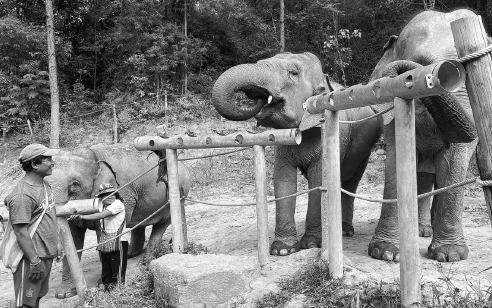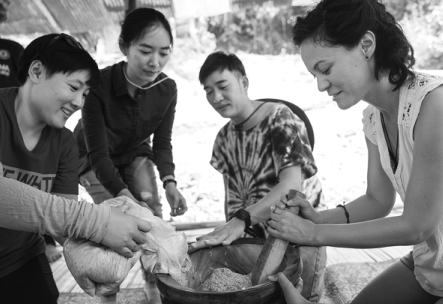Go see the elephant in the wild
More and more Chinese tourists are excluding elephant rides and shows from their itineraries and instead going on animal-friendly tours

Wan Fei will spend her winter vacation with her husband and 5-year-old son in Thailand, a relatively warm and friendly place and a popular destination for Chinese tourists, particularly in the winter. Searching online for hotels and services specially designed for parents with children, she focused on two travel agencies, and finally picked the one that did not offer animal entertainment, elephant rides for example, a favorite of tourists visiting Thailand.
Working as an accountant in Beijing, the 35-year-old Wan is also a member of a nongovernmental animal charity group that helps rescue stray cats and dogs in the city, as well as raises funds for their medical treatment and upkeep, and finds them homes.
"I will not spend money on animal entertainment," she said."Although I have never taken an elephant ride, I can imagine how an elephant suffers, particularly when it is forced to learn to follow the mahout's instructions.
"Their condition is worse than the animals in the zoos, who are confined to a cage or forced to live in a small area for the rest of their lives ... I can never enjoy the entertainment provided by 'imprisoned' animals and will teach my son not to do so."
Wan is not alone in shunning elephant rides and shows. A recent report said that an increasing number of Chinese tourists are availing of wildlife-friendly tours that do not use or hurt animals. According to the report jointly prepared by World Animal Protection, an international nonprofit animal welfare organization, and CCTV Market Research last year, more than 70 percent of the Chinese tourists said they would rather opt for wildlife-friendly tours even if they are more expensive.
The report also said that nearly 70 percent of those tourists traveled overseas, especially to Asian, African and European countries, to see wildlife at least twice a year. Also, more than 90 percent of them said they ensure that their activities would not affect animals before they join any wildlife safari. And about 60 percent said they would refuse to take part in tours that could interrupt the life of animals or harm their habitats.
Favorite destination
As a favorite destination in Asia for Chinese tourists, Thailand received more than 10.5 million Chinese travelers in 2018, with experts saying the number last year could only have been higher.
However, a study shows that poor elephant welfare in the tourist industry is a big problem in Asian countries such as India, Laos, Cambodia, and especially in Thailand. Between 2014 and 2016, the Wildlife Conservation Research Unit of Oxford University's Department of Zoology conducted surveys on the living conditions of nearly 3,000 elephants used for tours and other tourist services, which showed that three in every four elephants were not taken proper care of-not given enough food, denied social contacts with other elephants and/or forced to live a small area.
In Thailand alone, more than 2,000 elephants are employed in the tourism industry, accounting for nearly 70 percent of all the elephants used in the tourism industry across the world. For thousands of years, Asian elephants have been used to clear forests, ferry logs and other activities, but only in the past few decades have people started to use them in the tourism industry, according to Jan Schmidt-Burbach, head of Wildlife and Animal Welfare research at WAP.
"This goes against the natural instincts and will ultimately impact their welfare, sometimes to the extreme," Schmidt-Burbach said."Because of the cruel training process and severely inadequate living conditions, those elephants have poor diets and they're usually chained when they're not performing, denying them any opportunity to socialize naturally with other elephants, which is a key part of their life in the wild."
A research conducted by WAP in 2018 shows that elephants suffer the most by being forced to live in poor conditions, and about 65 percent of the mahouts often or very often use a bull-hook or a sharp nail attached to a stick to control the elephants.
"Hundreds of thousands of wild animals across the world are taken away from their natural habitats, forced into captivity and subjected to abuse, both mentally and physically, to provide entertainment for tourists and earn profits for the owners," said Zhao Zhonghua, country director of World Animal Protection China. He also warned that animal entertainment poses a threat to both the animals and tourists. For example, humans run the risk of contacting zoonotic diseases from infected animals.
Situation changing
However, encouraging changes have been witnessed in recent years. According to the WAP, the numbers of Chinese tourists taking elephant rides in Thailand declined 13 percent and those watching elephant shows fell 26 percent from 2017 to 2019. By the end of last year, more than 250 travel agencies worldwide, including 15 Chinese agencies, had joined the WAP's campaign and removed elephant rides and shows from the tour itineraries.
Chen Jie, chief executive officer of Beijing-based Caissa Tosun Travel Service (Group), one of China's biggest travel companies, said his company stopped offering elephant rides and shows to tourists in May 2018 and instead now provides animal-friendly tours without any direct contact with wild animals or disturbing their natural habitats.
Initially, some tourists were reluctant to forego elephant rides and shows, Chen said."But the idea gradually gained support after we replaced them with animal-friendly tours, such as guided tours of professionally maintained animal welfare camps where the tourists can watch elephants from a distance and participate in charity activities to fund elephant protection programs."
"People have become more aware of animal protection. And tourists can gain better knowledge about elephants by visiting well-maintained elephant camps and donating to animal charity, which is more meaningful than just riding an elephant," Chen said.
Elephant camps
The effects of such efforts are evident in Thailand's elephant camps too. Some camps played the pioneering role in preventing cruelty to elephants and offering elephant-friendly attractions. ChangChill (meaning "relaxed elephants" in Thai) in Chiang Mai, northern Thailand, is one such pioneer. Supakorn Tananseth, owner of ChangChill, comes from a family that has worked with and taken care of elephants for generations. In 2018, he attended an animal protection and tourism conference, and realized the potential of the new, ethical tourism model.
In 2019, he closed his camp, then called Happy Elephant Care Valley for several months, to rebuild it into ChangChill, which today is home to six female elephants. In ChangChill, elephants don't carry tourists. Instead, they are allowed to live freely in the woods.
Tourists can watch them from a distance under the direction and watchful eye of tour guides. Wandering freely in the forest, the elephants are led to the camp by mahouts before "lunch time" when they are served bananas, especially prepared herb and salt balls, and other nutritious foods. Travelers can make these balls, and even serve them to the elephants through a food pipe.
In the afternoon, the tourists can watch the elephants bathe in the nearby river, and learn about them from the mahouts, or spend time with members of the local Karen hill tribe to learn about their culture. Without going near them, visitors can see the elephants spending their day in the forest.
Since it opened in May last year, ChangChill has seen a steady growth in tourist numbers.
"Income from serving 160 tourists a month can support the camp, and we are almost fully booked for three months," said a ChangChill tour guide named Goi. The welfare camp benefits both elephants and mahouts, she said.
"Elephants are much happier and healthier. Mahouts have less confrontation with elephants. And since we limit our daily visitor number to 12, mahouts get to enjoy more spare time."
On TripAdvisor, a major tourism platform, ChangChill has won praise from a lot of visitors. A tourist named "frank758" from Sydney said it's really good to see elephants lead a normal life and wished all captive elephants in Thailand could live like the elephants in ChangChill.
The remarks of Audrey Mealia, group head of WAP's wildlife, are especially encouraging: "Since we launched the global campaign to fight against elephant entertainment in 2016, we've seen remarkable changes with an overall drop of more than 10 percent in the acceptability of riding an elephant."
Mealia also said that many camps in Thailand are not providing elephant rides and shows for tourists and instead offering them the chance to see the elephants bathing in rivers or lakes.
"We want to see all the elephants in captivity in Thailand in ... only programs where they are free to interact with each other and form close family bonds, which is so vital to their well-being," she said.
Apart from educating the tourists, Mealia said she also encourages more tour agencies to adopt an alternative approach like what ChangChill has done. "Most people come to realize that this is a much more rewarding experience and camps such as ChangChill are leading the way with this new model," she said.
The future of captive elephants indeed looks encouraging.


Today's Top News
- Xi presents orders to promote two military officers to rank of general
- Xi congratulates Jose Antonio Kast on election as Chilean president
- China urges opposition to Japanese official's remarks about possessing nuclear weapons
- Ukraine says latest peace talks with US, Europe 'productive'
- Asia's rise and Europe's structural decline
- Economic stability a pillar of China's national security






























